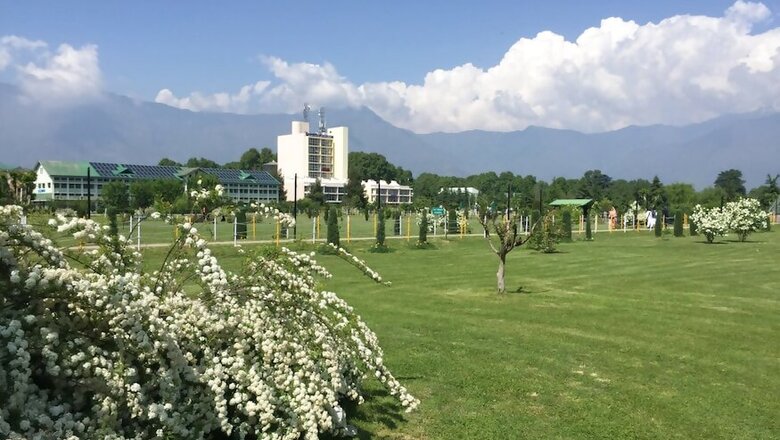
views
Srinagar: Tawheed Ahmad was caught by surprise when his hostel room was suddenly repaired. The broken electrical switches were replaced.
Till a few days ago, Ahmad, a research scholar at Kashmir University, had been making the rounds of the administrative office and urging officials to do the needful, but no one ever came.
Ahmad was told by his fellow researchers that a NAAC team was scheduled to visit the university. As he ventured out of the hostel, which has become his second home now, more such surprises awaited him.
“In the last seven years, I have never seen anything like this happening. Almost every building got a fresh coat of paint. The gardens were cleaned and the footpath got a new look,” he says.
On May 2, a team of National Assessment and Accreditation Council (NAAC), the organisation that assesses and accredits higher education institutions in India, visited Ahmad’s campus.
NAAC is an autonomous body funded by the University Grants Commission, which decides the amount of monetary support a university would get on the basis of its overall performance.
This explained the motive behind the clean-up activities at the university.
“Washrooms were cleaned. Broken furniture was replaced and the main buildings got a new look,” says Ahmad.
“Abruptly, everything appeared calm, in order, and the campus looked clean. No cars were allowed on the campus. Everything was surreal,” he says.
However, students find all these cosmetic as nothing has been actually ‘fixed’.
Jammu and Kashmir University, which established in 1948, was later, was split into two full-fledged universities — University of Kashmir at Srinagar and University of Jammu at Jammu.
The University of Kashmir is the state’s largest institute higher education given the number of full-time students enrolled.
Located in the midst of mighty Chinars, close to the banks of famed Dal Lake and in the backdrop of snow-peaked mountains, the campus stuns one and all. The green gardens with a dash of spring bloom add to its charm.
While everyone admires the beauty of the university, students have a contrasting image to present. They say there’s covert “intimidation” from the administration.
“This is not a botanical garden university,” says Saba, another research student, adding “The campus looks beautiful and green, but otherwise it’s a mess.”
“We were told not to make any complaint to the NAAC team,” says Sofiya, a post-graduate student. “There is silent intimidation that if we talk about the problems, our university grades will be affected, which will be bad for students and not for the teachers.”
Only class heads and some selected students were allowed to interact with the NAAC team, that too, after a “demonstration” on “how and what type of questions they should ask”.
“We were told that NAAC team will ask for suggestions during the interaction,” says another student wishing not to be named. “So the teachers gave us a demonstration on how to respond in a way that won’t bring a bad name to the university.”
News18 talked to about 40 students of the university all of whom were of the opinion the cosmetic changes were made to appease the central team, while they were not allowed to raise the genuine issues that need to be addressed.
None of them, however, wanted to be named as they feared the university would take action against them or “create a problem directly or indirectly.”
“Whenever a student talks about the genuine issues, he or she is subjected to harassment,” says another research scholar. “The persecution is mostly indirect. Either a professor will start cornering you or some issue will be created in the administrative department,” he adds.
The students say they want better NAAC grading for the university, but seeks to voice their concerns, as well. “We are being chocked. Is it a crime to raise voice against the university administration,” asks Ahmad. The university was awarded grade “A” by NAAC in 2011 and since then, nothing much has changed here.
The students are of the opinion that “nothing will change for them even if NAAC enhances the grade of the university”.
“When the NAAC team visits again, there would be another cosmetic facelift to give the impression that the university is progressing,” says Tabinda, a post-graduate student.
But what are the concerns of the students?
“What is more important? To impress the NAAC team with this sudden renovation or create a better atmosphere for the students,” asks Tabinda.
Some of them allege that there are professors who come at 1pm and leave in an hour.
“Our professors are not accountable to anyone. They have created strong lobbies and no one can speak against them,” says Ahmad, adding, “There are some really good faculty members, but our concern is accountability.”
The biggest concern, the students say, is that their voices are being muzzled.
“When a professor writes against the state, he is being lauded. When a student writes anything, he is being tagged anti-national,” says Wajahat, another research scholar.
“The actual concern of the administration is not what we write. They don’t want us to grow as critics. They don’t want us to write anything against the university,” says Wajahat.
The research scholar makes an annual visit to Jawaharlal Nehru University (JNU) in New Delhi to read up on updated literature for his research.
“If a book is published in 2017, it will reach our library in 2020,” says Wajahat, adding, “If I write an article on this, I will be harassed.”
Wajahat says everything is being linked with the Valley’s conflict. “I’ll be tagged as someone who is promoting some agenda and soon, word will be spread to malign my image. This is what happens,” he adds.
There are also allegations of corruption against the authorities.
“Corruption is prevalent in the administrative section and there is no one to take care of that,” says Saba.
There are about 500 students doing research in the university and most of them are from the rural areas. However, the Gani Kashmiri Research Scholars Inn can accommodate only 52 students.
“The hostel for research students was inaugurated in 1979 and since then, no infrastructural addition has been made,” says another scholar. “Most of the students arrange for their own accommodation outside which is costly.”
The students also allege that the authorities are giving away hostels facilities to boarders without considering their merit, adding that there isn't a way to even lodge a complaint or get any issue resolved.
“For instance, if there are some issues and we want it to be resolved I don’t know how to do it. Since years, I have been writing to the authorities that we should get updated books in our library, but no one is paying attention,” says Wajahat.
“When I went to the office of a top university official once and protested over the matter, he told me to go to Pakistan and find my books there,” he says.
The desperation of the university to appease the NAAC team is reflected by the manner in which an artwork was used without the creator's consent.
Sama Beg, an entrepreneur, and her colleague had published a calendar, last year, portraying 12 inspirational Kashmiri women.
During the NAAC team’s visit, the university’s Centre for Women’s Studies and Research downloaded the artwork from Beg’s website and pasted it on one of the department’s walls.
Beg says she tried to raise the issue of blatant violation of copyright law with the university, but couldn’t do much. The artworks were removed after the NAAC team left the campus on Saturday.
Dr Nisar, registrar of the university, termed these repairs as “preparations for guests.”
“If a guest comes, we make some preparations. That is what we did. There was nothing massive, whatever could be done in one week’s time, we did,” he told News18.
When asked about the allegation that selected students were allowed to interact with the central team, Nisar said no such direction was passed.
The students even allege that most of the vernacular press refuse to take note of their concerns as some of the university employees are also working in leading newspapers of Kashmir.
“When we try to highlight our issues in local press, articles in praise of the university are published instead,” says Saba.
They only wish the university looks as calm and clean on other days as well.
(Names of all the students have been changed)













Comments
0 comment